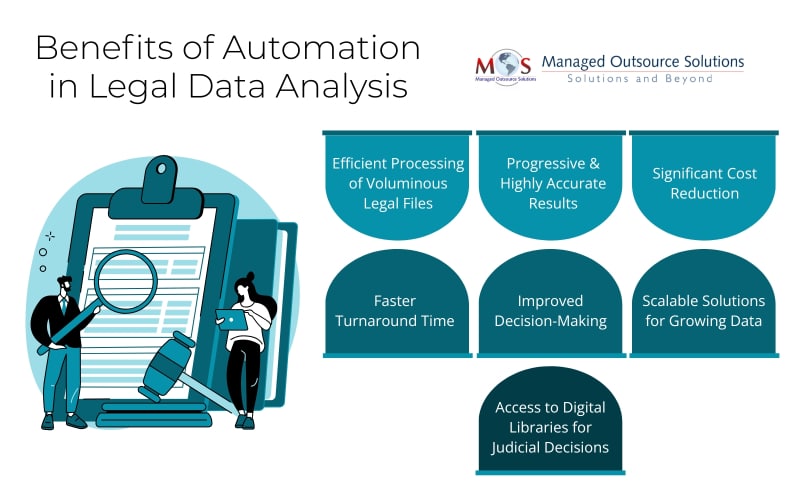In today’s fast-paced legal landscape, legal professionals deal with large chunks of data requiring to be processed quickly and effectively. One of the most transformative developments reshaping the legal industry is automation in data mining. Effectively managing this data with automation can help a law firm scale to greater heights. Data mining involves a combination of artificial intelligence and advanced analytics that help law firms analyze large volumes of data, uncover patterns, and streamline complex processes. Right from legal research automation to predictive case outcomes, automation is changing how law firms operate at their core. In this post, we will discuss in detail the significance of automation in the legal sector and how automation in data mining is an advantage for law firms.
The Role of Data Mining in Law
Data mining refers to the process of extracting meaningful insights from large datasets. When it comes to the legal sector, these datasets may include case law, court rulings, contracts, client records, discovery documents, and more. By automating this process, law firms can identify legal precedents, spot trends, and make informed decisions without manually reviewing thousands of documents.
Discover how automation can streamline your legal processes .
For customized legal tech consultation
How Do Law Firms Use Data Mining to Streamline Legal Research?
Legal research is one of the most time-consuming tasks for any law firm. Attorneys often spend hours or even days, poring over case law and statutes. Legal research automation powered by data mining enables law firms to quickly filter through massive databases and retrieve highly relevant information in seconds. For instance, AI-driven tools can analyze previous judgments to determine which arguments were most persuasive in similar cases. Lawyers can then use this insight to build stronger legal strategies, backed by data. This not only saves time but also improves the accuracy and depth of legal research.
Beyond research, legal process automation is being widely adopted to handle repetitive and rule-based tasks such as contract review, due diligence, compliance checks, and e-discovery. Automation tools can scan thousands of legal documents to identify clauses, flag risks, and even suggest edits, which earlier required a team of paralegals or junior lawyers. Automating these processes allows legal professionals to focus on high-value tasks such as client strategy and litigation. It also reduces human error, ensures consistency, and speeds up case preparation timelines.
Below discussed are some of the common benefits of automation in legal data analysis:
- Helps to Process Voluminous Files: Law firms face severe challenges when it comes to dealing with voluminous data continuously. Automation in data mining helps faster reading, extraction and analysis from a high volume of documents. As the world is evolving to be more data-driven and data-dependent, automation ensures effective and faster client satisfaction by combining artificial intelligence (AI) and data mining techniques.
- Progressive and More Accurate Results: Manual data analysis often involves reviewing complex legal texts, contracts, and case histories. These tasks are prone to human error due to oversight, or misinterpretation. Digitizing data in a law firm helps reduce the chance of potential human error and eliminates the labor costs involved in the tedious process of physically storing data. Automation assists the data mining process through self-analysis by machines leading to progressive and more accurate data. Automation tools, especially those powered by AI and natural language processing (NLP), are trained to scan and extract information consistently across documents. This ensures fewer missed clauses or important legal precedents, uniform interpretation of legal language and enhanced compliance through systematic cross-checking. By minimizing errors, law firms reduce the risk of flawed arguments or regulatory penalties.
- Cost Reduction: Hiring large teams of legal assistants or analysts to manually process legal data can be expensive. Automation reduces operational costs by replacing repetitive, labor-intensive tasks, reducing the number of hours billed internally for document review and allowing firms to handle more cases without expanding staff. This makes legal services more affordable and scalable, especially for mid-sized firms or in-house legal departments.
- Faster Turnaround: Legal cases are often time-sensitive. Manually sifting through volumes of legal documents can take days or even weeks. Automated data analysis tools can search and extract case law in seconds, generate summaries of long legal documents and highlight relevant sections based on keywords or topics. This speed allows attorneys to meet deadlines efficiently and respond to client needs more quickly, especially during litigation or contract negotiations.
- Enhanced Decision-making: Automated data mining uncovers insights that might be invisible to human reviewers. For example, it can detect patterns in court rulings, judge behavior across jurisdictions and common risks or clauses in contracts. These insights allow legal teams to make strategic, evidence-backed decisions, whether they are advising a client, crafting a litigation strategy, or deciding whether to settle a case.
- Scalability: As law firms grow or take on complex cases, they need the capability to handle larger datasets and more clients without compromising quality. Automation supports scalability by analyzing large volumes of legal data simultaneously, managing diverse types of data (emails, contracts, financial records, etc.) and providing consistent outputs, regardless of case size or complexity. This allows small teams to perform like larger firms, increasing competitiveness and profitability.
- Digital Libraries for Judicial Decisions: Data mining helps in information analysis and to build smart digital libraries. Digital libraries are continuously updating themselves resorting to automation. The process of automation helps to dig out judicial decisions in similar cases in turn improving the accuracy of legal advice.
Real-world Applications in Law Firms
Top-tier law firms are leveraging automation in data mining to gain a competitive edge. For instance, legal AI platforms use natural language processing to provide lawyers with instant access to relevant case law and legal interpretations. Some firms are using predictive analytics to estimate the chance of success in a trial based on past judge rulings, opponent legal strategies, and jurisdictional history. This can be a powerful tool in advising clients, deciding whether to settle or proceed to trial, and allocating firm resources effectively.
While the adoption of automation is growing, it does not come without challenges. Data privacy, algorithmic bias, and the need for human oversight are critical concerns. Lawyers must ensure that automated systems comply with legal and ethical standards, particularly when sensitive client data is involved. Moreover, the technology is not a replacement for legal expertise. Rather, it is a tool to augment human judgment. The interpretation of data, final decision-making, and courtroom representation still require the skills and experience of qualified legal professionals.
The integration of automation in data mining is just beginning. As technology evolves, we can expect even more advanced applications in legal forecasting, real-time compliance monitoring, and AI-powered client management. Automation in data mining is redefining the traditional legal workflow. Through legal research automation, legal process automation, and enhanced data analysis, law firms are streamlining operations, reducing costs, and delivering better outcomes for clients. The benefits of automation in legal data analysis are too significant to ignore, especially in a competitive legal environment. Understanding how law firms use data mining to streamline legal research is key to embracing innovation in the industry. For law firms aiming to stay relevant and effective, adopting automation isn’t just a choice – it’s a strategic imperative.





